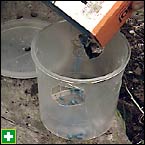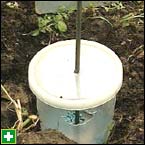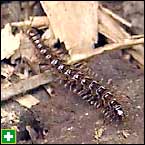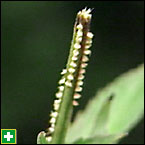Winter
bugs
Just when you
thought your garden had gone to sleep for the winter, tiny critters
begin gnawing on your plants.
Winter may be here, but
so too are those infuriating little critters that chew and suck
on your prized plants. Ruud Kleinpaste checks out what creatures
are busy in your garden this winter.
Snails and Slugs
Snails and slugs can
be devastating in your garden and can decimate entire plants if
you are not vigilant about controlling them. Generally it pays to
clean up debris where the slugs and snails can hide. Weed control
also helps to eliminate alternative feeding and hiding places.
Baits or pellets are
the standard control method. But beware, pets have been known to
take a liking to slug pellets. Here's a pet friendly way to
get rid of snails and slugs.
 1) Find a plastic container with a
lid. 1) Find a plastic container with a
lid.
2) Place a few large
entrance holes in the side of the container, big enough for a snail
to enter, drill a small hole in the top of the container and also
the bottom.
3) Put some snail bait
inside the plastic container and put the lid on.
4) Put a bamboo stake
or stick through the top and bottom hole and place in the garden
at ground level  so the snails can easily find their
way inside the container. so the snails can easily find their
way inside the container.
5) Bricks may also be
placed around the container to stop it moving. The idea with this
trap is that the bait keeps dry in the container and pets cannot
access it. Voila!
If pellets are not applicable
then a liquid formulation such as Slug Off will work for 10 weeks
or so.
Millipedes and
Centipedes

Millipedes and centipedes
look similar but are actually very different. Knowing the difference
between the two is very important. Some millipedes are troublesome
pests, but some feed exclusively on rotting materials in the garden.
Centipedes feed entirely on other insects, so they are beneficial
in your garden. Encourage composting millipedes and predatory centipedes
into your garden, but if you want to get rid of them, eradicate
damp hiding places or go for a liberal application of lime.
Passionvine
Hoppers

Passionvine hoppers are
tiny moth-like insects with mottled wings that suck the sap from
plants and cause your plant to lose its vigour. They can also cause
honeydew and sooty mould.
They overwinter by laying
eggs, so you can stop the cycle by finding and destroying their
eggs and eliminating egg-laying sites such as tendrils, thin woody
twigs and dying stems.
Soldier Flies
Soldier flies will
be in the midst of a larvae period at present, and although
they aren't very nice to look at they are useful in helping to break
down garden waste. If you do notice a soldier fly in your compost
heap, add some dry matter to it, because it's probably an indication
that your compost is too wet.
Garden debris and weeds
will provide a home for insects, weed seeds and diseases during
the winter so give you garden a thorough clean to protect it over
the winter. Proper fertility, mulch and adequate water at the right
time will also help you in the never ending battle against bugs.
Remember that healthy vigorous plants are a lot less attractive
to bugs than stressed, unhealthy plants.
Reproduced
with permission from NZOOM Home and Garden content,
from the previous
website of 
The views expressed here are not necessarily those of the RNZIH
 |
|
HOME
AND GARDEN |
|
|
More
Garden Articles
|